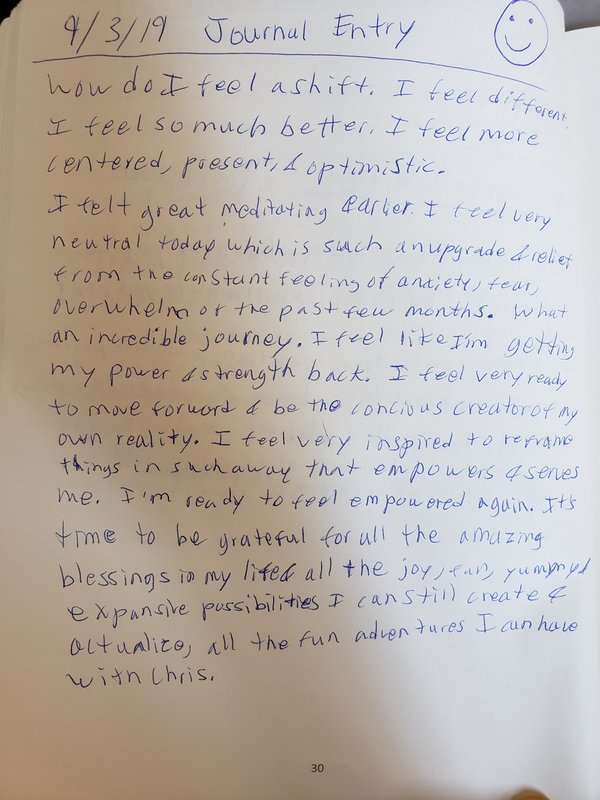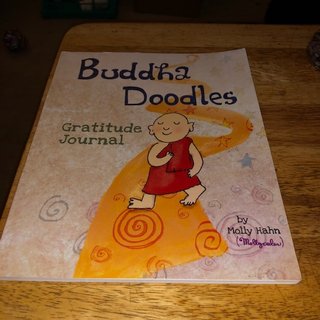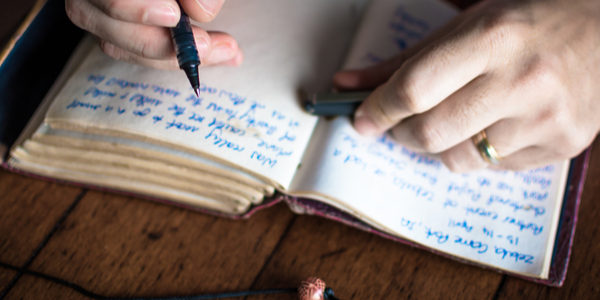Don’t Be Lazy. Journal for Success.
Good morning. QueenBee here! Today’s topic is, “Don’t Be Lazy. Journal for Success.” Let me reveal that writing in his journal is one of John Wright’s secrets. Like those who have built fulfilling lives before him, John uses journaling to build his business and continually expand his life. In fact, writing in his diary is one of his daily morning success rituals. It helps him clarify his thinking and feelings so that he has a consistent framework for planning his actions. Here is a photo of one of his entries for September, 2019:

Did You Know that…?
There’s been people recording their experiences almost as long as there have been people. Have you ever seen ancient pictures in caves? Aren’t they just a symbolic representation of the cave people’s experience? Think how powerful this tool is considering the very earliest records of man were created in this way.
Journaling helps people manage stress. I just read an article by Thrive Global, an organization developed to help people deal with stress at work so that they don’t develop burnout and can be more creative. They mentioned that history’s great minds including Isaac Newton, Abraham Lincoln, Andy Warhol, Leonardo Da Vinci, Marcus Aurelius, Charles Darwin, Winston Churchill, Benjamin Franklin, Ernest Hemingway, George Bernard Shaw and Maya Angelou spent time journaling to express things that they knew would never be seen by a living soul. Imagine how this helped them manage the pressures they were under.
One of my favorite podcasters and success coaches, Tim Ferris, calls journaling:
the deloading phase in life….I use it as a tool to clarify my thinking and goals, much as Kevin Kelly (one of my favorite humans) does. The paper is like a photography darkroom for my mind.
I Can’t Find the Time
One of my long time success coaches taught us that people use time excuses when they really don’t understand how changing their behaviors will benefit them. So, let’s give you good reasons for journaling so that you, too, can join the successful people we’ve already mentioned and spend 10-30 minutes journaling daily.
Benefits of Journaling
Journaling:
- about traumatic events helps one process them by fully exploring and releasing the emotions involved.
- engages both hemispheres of the brain in the process, allowing the experience to become fully integrated within one’s mind
- can also help you to focus on areas of your life that you’d like to focus on more often, as is the case with gratitude journaling or even coincidence journaling.
- has many health benefits. They’ve been scientifically proven. Research shows the following:
-
- Journaling decreases the symptoms of asthma, arthritis, and other health conditions.
- It improves cognitive functioning.
- It strengthens the immune system, preventing a host of illnesses.
- It counteracts many of the negative effects of stress.
-
(Information based on article in VeryWell Mind.)
How Do I Start Journaling?
You don’t need much equipment to journal. In fact, I carried a small 3″-4″ notebook in my purse for years. I would write gratitude statements in the journal, as blessings came my way during the day. Here’s what you need:

This is my current Gratitude Journal. But, any notebook with lined paper or a journal you like and a pen or pencil will get you started. Some people like to use colored pens and pencils and change colors between statements. They feel this stimulates creativity.
Gratitude Journaling
The easiest way I found (both personally and for clients) to start journaling is to create a Gratitude Journal. A Gratitude Journal is a notebook you write and draw in that is dedicated to showing your gratitude for the blessings in your life. When I start working with a client, I have them find a notebook and pen and have them write five things they are or could be grateful for. I encourage them to consistently do this daily and eventually ask them to write 5 statements first thing in the morning and last thing at night as part of their daily success rituals.
If they can’t find more than five things to be grateful for, I have them write the same five things daily until that circumstance shifts, because consistent journaling will create a shift!
John’s Journal
I’ve had the privilege of looking at John’s journal, and it is quite a mix of journaling styles. Of course, he does gratitude journaling. That’s where he began his process, i.e., by being grateful for what was working in his life in the face of all that he felt was wrong. He also uses his journal to plan for his travels from California to Georgia and back as well as noting business ideas and developing those he’s inspired to follow. He keeps track of details about his meetings in his journal, too. Additionally, I’ve seen John do emotional release work in his journal. When emotions come up, instead of bottling them up, he writes them down. He also journals for change. When he wants to make a change, he keeps a detailed record of where he starts, what he changes, and the results he notices. (By the way journaling for change is a good way to shift a bad health habit into a better one.) Finally, he journals to get clear about what is happening right now. As a successful business person, he has to come to grips with what is really happening in his business, not what he wishes or fantasizes is happening.
Why Am I Sharing This Post?
I feel very excited to make this pre-announcement! As John begins to add coaching to Bee Wild’s lifestyle offerings, I want to assure you that he walks his talk. He just doesn’t coach people to use tools he’s only read about. He uses these tools, gets value from them, measure the benefits in real dollars, and then shares his experience. Stay tuned for our next blog outlining this valuable addition to John’s repertoire.








